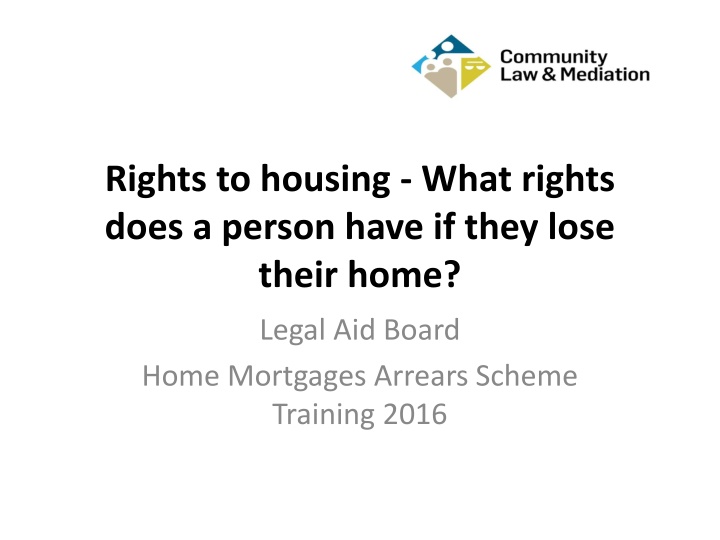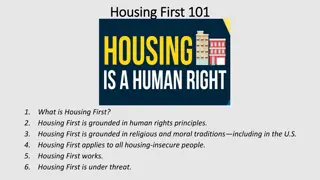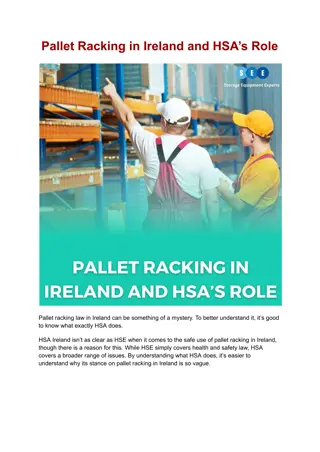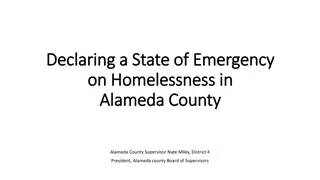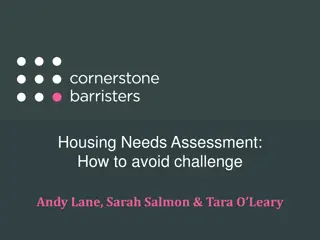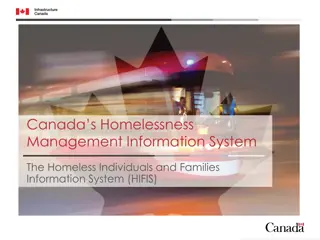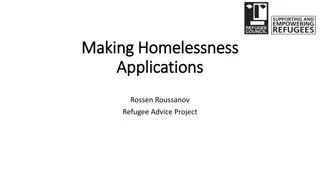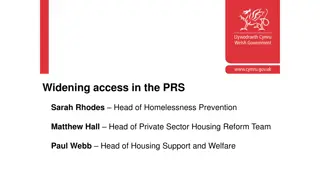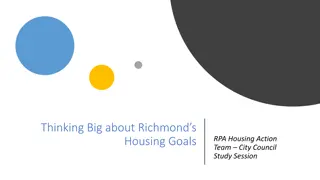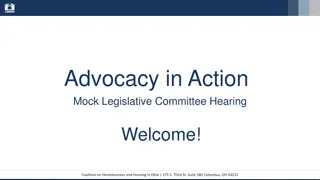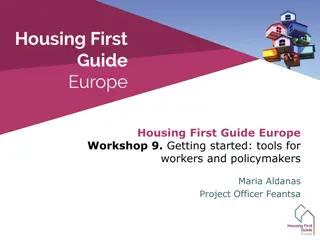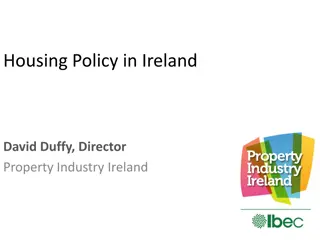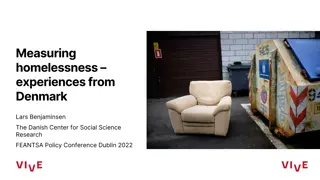Rights to Housing in Ireland: Understanding Homelessness Crisis
Amid a homelessness crisis in Ireland, individuals facing mortgage arrears lack a specific right to housing. Explore the causes, statistics, and procedural and substantive rights related to this issue.
Download Presentation

Please find below an Image/Link to download the presentation.
The content on the website is provided AS IS for your information and personal use only. It may not be sold, licensed, or shared on other websites without obtaining consent from the author.If you encounter any issues during the download, it is possible that the publisher has removed the file from their server.
You are allowed to download the files provided on this website for personal or commercial use, subject to the condition that they are used lawfully. All files are the property of their respective owners.
The content on the website is provided AS IS for your information and personal use only. It may not be sold, licensed, or shared on other websites without obtaining consent from the author.
E N D
Presentation Transcript
Rights to housing - What rights does a person have if they lose their home? Legal Aid Board Home Mortgages Arrears Scheme Training 2016
Community Law and Mediation Formerly known as Northside Community Law Centre. Two Community Law Centres: CLM Northside based in Coolock CLM Limerick Services also include: Free mediation service Community education Casebase Law Journal
Todays Topic The right to housing for someone who has lost their home due to mortgage arrears either through court ordered repossession or voluntary surrender or sale.
In short There is no right to housing in Ireland
Homeless Crisis Figures In Dublin alone, 769 families including 1,570 children are currently in emergency accommodation with 125 families becoming homeless in Dublin in January 2016-a record high and up from a figure of 41 in December 2015. Dublin Regional Homeless Executive Figures, January 2016.
What is causing the Increase? Mortgage arrears crisis The State s consistent failure to build social housing The State s policy to delegate responsibility to the private rental market.
Central Bank statistics In 2015 legal proceedings were issued to enforce security on a principal dwelling house mortgage in 894 cases repossession orders - 203 cases possession by lenders 340 properties voluntarily surrendered or abandoned 178 properties
Procedural Rights Right to apply for social housing assistance Right to be assessed for social housing assistance Right to an independent proportionality assessment
Substantive Rights Right to a proportionate decision Right of appeal Right to transparency and compliance Rights for children to adequate shelter, food, clothing, medical care and education Right to privacy Right to life and bodily integrity Rights to family consortium, to dignity and to person (ECHR article 8 right to privacy and family life)
Home Mortgage Arrears Scheme CLM roundtable November 2014 Submission published advocating early and ongoing legal support for individuals facing the loss of their home due to mortgage arrears along the model of support provided by the Housing Rights Service in Belfast: financial and legal assistance to borrowers legal advice and representation in relation to court repossession proceedings advice and assistance in relation to accessing social housing entitlements.
Todays Focus 1.The different ways that a client can lose ownership of their home as a result of mortgage arrears i.e. voluntary surrender, voluntary sale, mortgage to rent and court ordered repossession. 2.Types of social housing supports available
Voluntary surrender & sale/mortgage to rent/ court ordered possession
Voluntary Surrender Voluntary surrender: where the borrower agrees with the lender that the lender can have full ownership of the property. Borrower remains liable for any amounts that are owed to the lender which they do not recover from the sale of the property including: accrued interest charges legal charges and other related costs. If the borrower is considering a voluntary surrender, the remaining debt must be discussed in detail with the financial institution.
Voluntary Surrender Advise the client re the possibility of residual debt, particularly where they are considering voluntary sale/surrender. The residual debt is now an unsecured as opposed to a secured debt Application for a Debt Settlement Arrangement could be made on the borrower s behalf by a Personal Insolvency Practitioner (PIP)
Voluntary Surrender Regulation 3 (g) (ii) of Statutory Instrument 321/2011 (Social Housing Assessment (Amendment)(No.2)Regulations) 2011, a client can be assessed for social housing support by their local authority following a decision by the Lender that their mortgage has been declared unsustainable, under the CCMA, even where legal proceedings have not yet commenced. This does not apply to a situation where a client has been assessed as non cooperating under the CCMA. Very broad definition & includes: (c) A three month period elapses where: (A) the borrower has not entered into an alternative repayment arrangement, and during which the Borrower: (ii) Meets their mortgage repayments in full in accordance with the mortgage contract but has an arrears balance remaining on the mortgage;
Voluntary Surrender NB-it is important to advise clients considering voluntary surrender that without the letter from their lender confirming that their mortgage is unsustainable, they may encounter difficulties accessing social housing supports.
Voluntary Surrender Borrower will lose control of the sale of his/her home. May sell for less when sold by the lender than by the borrower. Land and Conveyancing Law Reform Act 2009 - lender is obliged to get the best price reasonably obtainable (see Section 103 (1)). Lender may pay more for the various services than a borrower would pay by shopping around. Additional charges for services such as security. Until the property is sold, the borrower remains responsible for the monthly payments, penalties & interest and insuring the property.
Voluntary Sale The same considerations re residual debt & accessing social housing supports as with voluntary surrender
Mortgage to Rent Mortgage to rent: Under this, possession of a privately-owned home is voluntarily surrendered to a mortgage provider, in circumstances where the home-owner cannot make mortgage repayments. The person will no longer own the home and will no longer have a financial interest in it. The mortgage provider sells the house to a housing association, which in turn rents it back to the original home-owner and that rent is assessed based on the client s income. The proceeds of the sale are used to reduce the mortgage debt and if the client s financial situation improves, there will be an option to buy the home back from the housing association after a period of 5 years.
Mortgage to Rent To qualify for the mortgage-to-rent option, the tenant must: Be involved in the Mortgage Arrears Resolution Process and agree that the mortgage cannot be paid now or in the future The property must be in negative equity, though a property in marginal positive equity may now be considered Own the property concerned and be living in it. Depending on the type and location of the property, it must not exceed a certain value Live in a property that is in good condition and suits the household s needs Qualify for social housing support from their local authority Not own any other property or hold assets in excess of 20,000. Not have a net household income over 25,000 or 35,000 a year for a single person ( 30,000- 42,000 for larger families), depending on the area in which s/he lives. Have a long-term right to remain in Ireland
Orders for Possession A stay is often granted on a court order for possession of several months to give families a chance to vacate or discharge arrears. Valid for twelve years Once the stay expires, an execution order can be applied for within that period. action can be taken effectively once the Order has been granted
Orders for Possession Sheriff or County Registrar will speak with the client about taking possession. It may be a good idea for the client to make contact with the Sheriff s office themselves to get some idea of the time frame involved. Where the client does not agree to abide by the directions of the Order or the Sheriff or County Registrar, bailiffs and Garda may be required in order to enforce the Court Order and take physical possession of the property.
Orders for Possession Land and Conveyancing Law Reform Act 2009 (S 103) - Lender shall ensure that the mortgaged property is sold at the best price reasonable obtainable. The Lender must notify the client of the outcome of the sale within 28 days Failure to do so is an offence. Following the sale of the property, all monies due to the Lender are deducted from the proceeds of sale. If the amount then owed to the Lender is greater than what is left, there is still a residual debt outstanding and this can then be pursued by the Lender as a stand-alone debt.
Types of social housing supports available
Social Housing Supports Once a person has lost their home either through voluntary surrender, voluntary sale or repossession, their housing options are: 1. social housing 2. private rented accommodation with the assistance of Rent Supplement or Housing Assistance Payment (HAP). Requirement of an application to a local authority to be assessed for social housing support. Assessment for social housing support can be made by a local authority following a decision by the Lender that the mortgage has been declared unsustainable, under the CCMA
Application for Social Housing Support Housing (Miscellaneous Provisions) Act 2009 - an applicant for housing no longer applies specifically for a local authority home. He/she now applies for Social Housing Support. A person who has been deemed eligible for social housing support, who cannot be housed in a local authority property or a voluntary housing association property, can apply for Rent Supplement or Housing Assistance Payment so that they can rent privately. Section 20 of the Housing (Miscellaneous Provisions) Act 2009 and the Social Housing Regulations 2011 sets out the process for assessing a person s eligibility for Social Housing Support. Section 32 of the Housing Act sets out a national application process for housing. It is important to note that it is not open to a local authority to impose an eligibility requirement on an applicant for social housing support unless there is a clear statutory basis for that eligibility requirement
Application Process Complete an application form Application assessment by the local authority and it is determined whether they are firstly eligible for housing and if they are eligible, whether they are in need of housing. The Social Housing Regulations 2011 provides that the local authority has twelve weeks to deal with the application for social housing support.
Determining Eligibility In determining whether an applicant is eligible, the local authority looks at whether the client: Is within certain income limits has a right to reside in the state long-term has significant history of rent arrears with a housing authority. does not have alternative accommodation
Determining in need of social housing In determining whether the client is in need of social housing, the local authority considers the type of housing they are currently occupying, for example, if: it is overcrowded or unfit there is a particular need for specific accommodation as a result of disability they are living in an institution, emergency accommodation or hostel, etc. their mortgage has been classified as unsustainable as part of the Mortgage Arrears Resolution Process.
Qualification eligible for + in need of social housing = deemed to qualify for social housing Placed on the waiting list, now known as the record of qualified households Each housing authority draws up its own rules for deciding order of priority on the waiting list. These are called schemes of letting priorities .
General Notes on the Rights of Applicants 1. A person is entitled to access all information held concerning them by the local authority, under the Freedom of Information Acts 1997-2003. 3 basic rights: a right to access records held by public bodies (section 6 request is made under s7); a right to have personal information in a record amended where it is incomplete, incorrect or misleading (section 17); and a right to obtain reasons for decisions affecting the person (section 18).
General Notes on the Rights of Applicants 2. The right to appeal complain and/or seek redress before the Courts. The decision of a local authority can be appealed. If the internal appeal is unsatisfactory, a complaint can be made to the Ombudsman or redress may be sought before the Courts.
General Notes on the Rights of Applicants 3. The right of children who are homeless to adequate shelter. This has been recognised as one of the rights of children under Article 42.5 of the Constitution. The HSE has an obligation under the Child Care Act 1991 to take reasonable steps to provide suitable accommodation for children who are homeless.
General Notes on the Rights of Applicants 4.The right to fair procedures in any application to the local authority for accommodation and support. This is required under the Constitution and the European Convention on Human Rights (ECHR). In their dealings with tenants, local authorities have to be fair and must give a proper opportunity to be heard
General Notes on the Rights of Applicants 5.The right not to be directly or indirectly discriminated against in relation to access to housing or other services on the grounds of gender, marital status, family status, sexual orientation, religion, age, disability, race or membership of the Traveller Community. This is provided for by the Equal Status Acts 2000-2004.
General Notes on the Rights of Applicants 6.Rights under the European Convention on Human Rights. Local Authorities are public bodies and as such, are required under section 3 of the ECHR Act 2003 to act in a manner compatible with the ECHR.A tenant s rights under the Convention, and indeed under the ECHR Act 2003 include the right to privacy, right to a fair hearing, right to a private and family life, freedom from discrimination and freedom from inhuman and degrading treatment.
PRIVATE RENTED ACCOMMODATION If the client s application for social housing support has been accepted by the local authority and if they cannot be accommodated in local authority or voluntary housing association property, they may be eligible for: Rent Supplement Housing Assistance Payment (HAP).
Rental Market The Census 2011 and recent trends illustrate a significant increase in persons seeking to rent property. In areas of high population density, people are finding it difficult to get access to suitable private rented accommodation, particularly where the applicant is in receipt of Rent Supplement. The latest Daft.ie Rental Report from Quarter 4 2015 shows that rents in Central Dublin have risen by 46% since 2010. Fewer than 1,400 properties were available to rent on 1 February 2015, lowest recorded since 2006. Other Irish cities saw double digit increases in rents in 2015. In Munster there were just 771 homes available to rent on 1 February.
Rental Market Since 1 January 2016, under the Equal Status Acts 2000 2015, a client cannot be discriminated against when renting because they are getting Rent Supplement or any other social welfare payment, or a Housing Assistance Payment (HAP).
Rent Supplement Rent Supplement: A person living in private rented accommodation may be entitled to Rent Supplement under the Supplementary Welfare Allowance Scheme. Rent Supplement will only be provided if : the accommodation is suitable for the person s needs the rent is below the maximum rent limit for the size of the person s family and for the particular county. Difficult to source property within the rent supplement limits. Community Welfare Service has statutory discretionary power to award or increase a Rent Supplement payment, e.g. danger of homelessness
Rent Supplement There are a number of other criteria including a means test and a habitual residence test. For clients, whose application for social housing support to the local authority was not granted, they may still qualify for rent supplement if: living for 6 months, in one, or a combination, of the following: o Private rented accommodation. o Accommodation for homeless people; or o An institution such as a hospital, care home, place of detention etc.
Rent Supplement The person will not qualify for Rent Supplement if they or their partner works full-time (30 hours or more) unless they have still been deemed eligible for the Rental Accommodation Scheme by the local housing authority. They may be able to retain Rent Supplement if they have been unemployed or not in full-time employment for at least 12 months before starting work, or if they have been participating in a Community Employment Scheme or obtaining Back to Work Allowance or Back to Work Enterprise Allowance immediately before starting work. Any new income from employment is taken into account, however, so the person may no longer qualify for Rent Supplement or may qualify for a lower rate. A person in full time education may be eligible for Rent Supplement if they are in receipt of the back to education allowance or are participating in the Back to Education or Momentum Programmes.
Housing Assistance Payment The Housing Assistance Payment (HAP) was introduced by the Housing (Miscellaneous Provisions) Acts 2014. HAP now operational in many housing authority areas. Different rules apply when accessing social housing supports depending on whether you live in a HAP area or in an area where HAP is not yet in operation. If you are housed under HAP, you will no longer be on the local authority s housing list. However, you can apply for transfer to other forms of social housing.
Housing Assistance Payment The HAP scheme aims to: Allow all social housing supports be accessed through one body - the local authority Allow people getting HAP to take up full-time employment and keep their housing support Under the HAP scheme, local authorities pay landlords directly. Tenants pay a weekly HAP rent contribution to the local authority, based on their income and ability to pay.
Housing Assistance Payment You will not be a local authority tenant The rental agreement will be between the tenant and the private landlord covered by the Residential Tenancies Act 2004 The local authority will not source the private rented accommodation
Housing Assistance Payment Rent Rent must be within the HAP rent limits for the household size and area Scope for flexibility in certain areas and for homeless households in Dublin The accommodation must meet minimum standards for rented housing Your landlord must have a current tax clearance certificate Client expected to remain in accommodation for 2 years
Housing Assistance Payment How to apply If client is not on the housing list, they will need to apply for social housing support. If client already on the housing list, and if HAP is operating in their area, they can ask the local authority for a HAP application form. Landlord will need to complete and sign part of application form.
